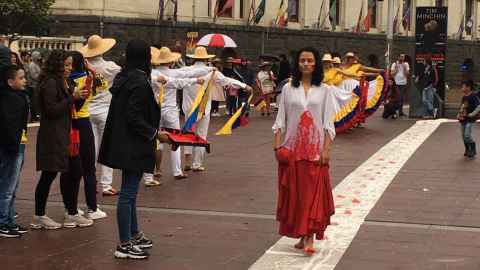Don’t turn a blind eye to what’s happening in Colombia
12 May 2021
Opinion: Colombian nationals call for attention to the human rights violations, disappearances, sexual abuse and killings of civilians in their home country.

Violence and repression against anti-government protestors by Colombian police squads have left at least 47 people dead since the unrest began late last month.
As Colombian nationals working and learning here in Auckland, we have a fundamental duty to raise international visibility of the breaches to human rights that are taking place in our country. During the weekend, Colombians gathered in different cities across New Zealand to support the people and demand the government to stop the violence.
The protests in Colombia began on April 28 when different unions and civil and social organisations across the country declared a nationwide strike against the recent tax reform proposed by the government of Iván Duque.
According to Forbes Colombia, 73 percent of Colombians support the strike and, amid the worst peak of the pandemic, millions have come out to the streets to protest, claiming that the government is more dangerous than the virus.
The tax reform that has brought this response seeks to raise taxes from the working and middle classes while exempting the wealthiest and avoiding penalties for tax evasion.
Duque has since withdrawn this reform, but protests have continued. The proposed reform triggered deep discontent related to political, judicial and police corruption, the lack of guarantees and inequity in access to health and education, an unemployment rate of 16.8 percent and the fact that 42.5 percent of Colombians live in poverty.
Added to this list is the right-wing government’s failure to comply with the peace agreements signed in 2016 with the FARC guerrillas (The Revolutionary Armed Forces of Colombia), which has resulted in the murder of more than 1100 social leaders and human rights defenders.
These days of protest have been marked by strong repression and abuses by the military forces. Although the Colombian government announced it would withdraw the tax reform bill, the protests continue. The marchers are demanding two new reforms in health and pensions be withdrawn, and that police and military abuse carried out during the days of protest be penalised.
... 73 percent of Colombians support the strike and, amid the worst peak of the pandemic, millions have come out to the streets to protest, claiming that the government is more dangerous than the virus.
The most worrying measure taken by the Colombian government is the militarisation of the cities, even overriding local authorities, as happened in the city of Cali on May 3. Many videos shared on social media show police officers wearing uniforms without an identification number detaining and assaulting civilians, while witnesses desperately ask them to say out loud their name and identification so they don't end up missing.
At the time of writing, Temblores (an NGO founded in 2016 as a watchdog of police violence) reported the repression by the armed forces has left at least 47 dead. There have also been 56 disappearances, 12 victims of sexual violence, 278 victims of physical violence, 963 arbitrary detentions and 1876 cases of police violence.
As academics watching this painful situation far from our country, we want to draw the international community’s attention to the human rights violations, disappearances, sexual abuse and killings of civilians at the hands of the military forces in the framework of social protests. We fear that militarisation is the prelude to the massacre of civilians by the Colombian armed forces.
The presence of national and international oversight missions and pressure from the international community is urgently required for the protection of human rights of Colombian citizens. We call for the Colombian state to stop the repression and violence of the armed forces and police.
Dr Maria Eugenia Guapacha Chamorro, Dr Orlando Chaves Varon, and doctoral candidates Alejandra Jaramillo Aristizabal and Anny Bertoli, are from the University of Auckland.
This article reflects the opinion of the authors and not necessarily the views of the University of Auckland.
Used with permission from Newsroom Don’t turn a blind eye to what’s happening in Colombia 12 May 2021.
Media queries
Alison Sims | Research Communications Editor
DDI 09 923 4953
Mob 021 249 0089
Email alison.sims@auckland.ac.nz